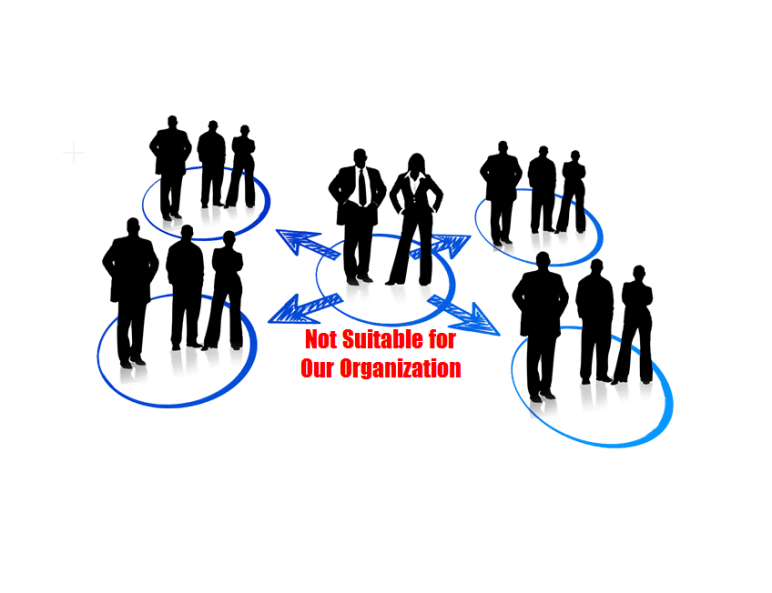Content scrapers are problematic for authors, defamation plaintiffs and website operators alike.
There is no doubt that there is typically a clash of interests between authors, defamation plaintiffs and the operators of websites who host public third-party content. Authors either want the information to stay or be removed; defamation plaintiffs want information removed from the website(s); and website operators, such as many of the online review websites, fight for the freedom of speech and transparency – often arguing, among many other things, that the information is in a public court record anyway so removal is moot. These kinds of arguments, often surrounding the application of federal law know as the Communications Decency Act, or Section 230 (which arguable provides that websites don’t have to remove content even if it is false and defamatory) are playing out in courts right now. One example is the case of Hassell v. Bird which is up on appeal before the California Supreme Court relating to a posting on Yelp. However, in spite of these clashes of interests, there does seem to be a trend emerging where the author, the plaintiffs, and the websites, are actually standing in the same boat facing the the same troublemaker.
Providing some background and context…
COPYRIGHT AND POSTING AN ONLINE REVIEW: Many people are familiar with the term “copyright” and have a basic understanding that a copyright is a legal right that is created by the law that gives the creator of an original work limited exclusive rights for its use and distribution. Wikipedia has some decent general information if you are interested in learning more. For example, a guy who I will call John for the purpose of this story, can get on a computer and draft up a complaint about Jane and her company XYZ before he posts it online on a review website. As it sits on John’s computer as written, John would own the copyright to that information. When John decides to post it online to a review website, depending on the website’s terms of service John may have assigned his copyright rights to the website in which he was posting on. So either John or the website may own the copyright to that content. That point is important for a few reasons, and there are arguments for and against such an assignment, but those issues are for another article some other time.
DEFAMATORY POSTING IS PUBLISHED ONLINE: Continuing with the story, let’s say that John makes a bad call in judgment (because he hasn’t sat through one of my seminars relating to internet use and repercussions from the same, or hasn’t read my article on not being THAT guy, and doesn’t realize how bad doing this really is) and decides to post his false and defamatory posting about Jane and XYZ to an online review website. It’s totally NOT COOL that he did that but let’s say that he did. Now that posting is online, being indexed by search engines like Google, and anyone searching for Jane or XYZ might be seeing John’s posting.
WHAT TO DO WITH THE DEFAMATORY POSTINGS: The internet tends to work at lightening speed and John’s post is sure to be caught on to by Jane or by someone who knows Jane or her company XYZ. As an aside, I always recommend that people and businesses periodically, like once a month, run searches about themselves or businesses just to see what pops up. It’s just a good habit to get into because if there is a problem you will want to address it right away – especially you think it is false and defamatory and want to take legal action because there are pretty strict statue of limitations on those – in many states only providing one year from the date of publication. When Jane learns of the posting, maybe she knows who John is by what was said in the posting – and maybe she isn’t sure who posted it – but either way chances are she is likely going to seek legal help to learn more about her options. Many people in Jane’s position will want to threaten to sue the website…but it’s actually not that simple. Why? Because unless the website actually contributed to writing the stuff, which they most likely didn’t, then they can’t be held liable for that content. That’s the law here in the United States – the Communications Decency Act. Fortunately, while online defamation is a niche area of law, there are many attorneys who are well versed in online defamation around the country that are able to assist people who find themselves in this kind of a situation.
So by now you are probably wondering how in the world a defamed party and a website could both be standing in the same boat. I promise I am getting there but I felt the need to walk through this story for the benefit of those who don’t work in this field and have little to no clue what I am even talking about. Baby steps…I’m getting there.
A FIGHT FOR REMOVAL: As I pointed out in the beginning, arguably under the law, websites don’t have to remove the content even if it is found by a court or otherwise to be false and defamatory and that leaves plaintiffs in an awkward position. They want the information taken down from the internet because it’s alleged to be harmful. What can be done all depends on the website the content is on.
REPUTATION MANAGEMENT: Many people think that reputation management is the way to go. However, while reputation management can be helpful in some instances, and I’m not trying to knock those legitimate companies out there that can definitely help a company with increasing their advertising and image online, many find it only to be a temporary band-aid when trying to cover up negativity. Similarly, in some cases, some reputation management companies may employ questionable tactics such as bogus DMCAs or fake Court Orders. Yes, those situations are real – I actually just presented on that topic to a group of internet lawyers less than two months ago and I caution anyone who is using or considering a reputation management company that guarantees removal of content from the internet.
A WEBSITE’S INTERNAL POLICING: The same law that protects websites from liability for third-party content is the same law that encourages self policing by providing for editorial discretion on what to post and not post. As such, some websites have taken their own proactive approach and created their own internal policing system where, depending on the circumstances and what was written, the website might find that the posting violated their terms of service and, within their discretion, take some sort of action to help a victim out. Not every website has this but it’s certainly worth checking into.
COURT ORDERS: Remember, a website, arguably per the law, doesn’t necessarily have to take a posting down regardless of what the court order says. Shocking, but this has been found to be true in many cases around the country. So what do websites do? Here are a few scenarios on how websites might consider a court order:
- Some websites will, without question, accept a court order regardless of jurisdiction and remove content – even if it is by default which can mean that the defendant didn’t appear and defend the case. It’s worth while to note that some people won’t appear and defend because: 1) they never got notice of the lawsuit in the first place; 2) they didn’t have the knowledge to fight the case themselves; and 3) they didn’t have the resources to hire an attorney to fight the case – let’s face it – good lawyers are expensive! Even cheap lawyers are still expensive.
- Some websites will remove a posting only if there is some sort of evidence that supported the court order – like the defendant appeared and agreed to remove or even if there is a simple affidavit by the author who agrees that the information is false and is willing to remove it.
- Some websites will only redact the specific content that has been found to be false and defamatory by the court based on evidence. This means that whatever opinions or other speech that would be protected under the law, such as the truth, would remain posted on the website.
- And still, other websites won’t event bother with a court order because they are out of the country and/or just don’t give a crap. These types of websites are rumored to try and get people to pay money in order for something to be taken down.
COURT ORDER WHACK-A-MOLE WITH SEARCH ENGINES LIKE GOOGLE: One of the biggest trends is to get a court order for removal and send it in to search engines like Google for de-indexing. What de-indexing does is it removes the specific URL in question from the search engine’s index in that particular country. I make this jurisdictional statement because countries in the European Union have a “Right to be Forgotten” law and search engines like Google are required to remove content from searches stemming from Europe but, that is not the law in the US. The laws are different in other countries and arguably, Google doesn’t have to remove anything from their searches in the US. Going back to our story with John, Jane and company XYZ, if Jane manages to litigate the matter and get a court order for the removal of the URL to the posting from search engine index, then, in theory, Jane’s name or company wouldn’t be associated with the posting.
Now this all sounds GREAT, and it seems to be one of the better solutions employed by many attorneys on behalf of their clients, BUT there are even a few problems with this method and it becomes a game of legal whack-a-mole:
- A website could change the URL which would toss it back into the search engine’s index and make it searchable again. The party would either have to get a new court order or, at least, submit the court order again to the search engine with the new court order.
- If sending the Court Order to Google, Google will typically post a notice to their search results that a search result was removed pursuant to a court order and give a link to the Lumen Database where people can see specifically what URLs were removed from their index and any supporting documentation. This typically includes the court order which may, or may not, include information relating to the offending content, etc. Anyone can then seek out the court case information and, in many cases, even pull the subject Complaint from online and learn exactly what the subject report said and learn whether or not the case was heard on the merits or if the case was entered by default or some other court related process. Arguably, the information really isn’t gone fore those who are willing to do their homework.
- The first amendment and many state privilege laws allow the press, bloggers, etc. to make a story out of a particular situation so long as they quote exactly from a court record. No doubt a court record relating to defamation will contain the exact defamatory statements that were posted on the internet. So, for example, any blogger or journalist living in a jurisdiction that recognizes the privilege law, without condition on defamation, could write a story about the situation, post the exact content verbatim out of the court record as part of their story, and publish that story online, inclusive of the defamatory content, without liability.
The up-hill battle made WORSE by content scrapers.
With all that I have said above, which is really just a 10,000 foot view of the underlying jungle, poor Jane in my example has one heck of an up-hill battle regarding the defamatory content. Further, in my example, John only posted on one review website. Now enter the content scrapers who REALLY muck up the system causing headache for authors, for defamation plaintiffs, and for website providers like review websites.
CONTENT SCRAPERS: When I say “content scrapers,” for the purpose of this blog article, I am referring to all of these new “review websites” that are popping up all over who, to get their start, appear to be systematically scraping (stealing) the content of other review websites that have been around for a long time and putting it on their own websites. Why would anyone do this you ask? Well, I don’t know exactly but I could surmise that it: 1) content helps their rankings online which helps generate traffic to their websites; 2) traffic to a website helps bring in advertising dollars to the ads that are running on their websites; and 3) if they are out of country (which many appear to be outside of the United States) they don’t really give a crap and can solicit money for people who write and ask for content to be taken down. I sometimes refer to these websites as copycat websites.
CONTENT SCRAPERS CAUSE HEADACHES FOR AUTHORS: Many people have their favorite review website that they turn to to seek out information on – be it Yelp for reviews on a new restaurant they want to try, TripAdvisor for people’s experience with a particular hotel or resort, or any other online review websites…it’s a brand loyalty if you will. An author has the right to choose which website they are willing to post their content on and, arguably, that decision could be based in part on the particular website’s Terms of Service as it would relate to their content. For example, some websites will allow you to edit and/or remove content that you post while other websites will not allow you to remove or edit content once it is posted. I’d like to think that many people look to see how much flexibility is provided with respect to their content before they chose which forum to post it on.
When a copycat website scrapes/steals content from another review website they are taking away the author’s right to choose where their content is placed. Along the same lines, the copycat websites may not provide an author with the same level of control over their content. Going back to my John, Jane and XYZ example, if John posted his complaint about Jane on a website that allowed him to remove it at his discretion, it’s entirely possible that a pre-litigation settlement could be reached where John voluntarily agreed to remove his posting or, John decided to do so on his own accord after he cooled down and realized he made a big mistake posting the false and defamatory posting about Jane online. However, once a copycat website steals that content and places it on their website, John not only has to argue over whether or not he posted the content on another website but also may not be able to enter into a pre-litigation settlement or remove it at his own direction. In fact, there is a chance that the copycat website will demand money in order to take it down – and then, who knows how long it will even stay down. After all the copycat website doesn’t care about the law because stealing content is arguably copyright infringement.
CONTENT SCRAPERS CAUSE HEADACHE FOR DEFAMATION PLAINTIFFS: As discussed within this article, defamation plaintiffs have an up-hill battle when it comes to pursuing defamation claims and trying to get content removed from the internet. It almost seems like a losing battle but that appears to be the price paid for keeping the freedom of speech alive and keeping a level of transparency. Indeed, there is value to not stifling free speech. However, when people abuse their freedom of speech and cross the line online, such as John in my example, it makes life difficult for plaintiffs. It’s bad enough when people like John post it on one website, but when a copycat website then steal content from other review websites, and post it to their website(s), the plaintiff now has to fight the battle on multiple grounds. Just when a plaintiff will make headway with the original review website the stolen content will show up on another website. And, depending on the copycat website’s own Terms of Service, there is a chance that it won’t come down at all and/or the copycat website will demand money to have the content, that they stole, taken down. Talk about frustrating!
CONTENT SCRAPERS CAUSE HEADACHE FOR REVIEW WEBSITES: When it comes to online review sites, it’s tough to be the middle man…and by middle man I mean the operator of the review website. The raging a-holes of the world get pissed off when you don’t allow something “over the top” to be posted on their website and threaten to sue – arguing you are infringing on their first amendment rights. The alleged defamation victims of the world get pissed off when you do allow something to get posted and threaten to sue because well – they claim they have been defamed and they want justice. The website operator gets stuck in the middle having zero clue who anyone is and is somehow supposed to play judge and jury to thousands of postings a month? Not that I’m trying to write myself out of a job but some of this stuff gets REALLY ridiculous and some counsel are as loony as their clients. Sad but true. And, if dealing with these kinds of issues wasn’t enough, enter the exacerbators, i.e, the copycat websites.
To begin with, website operators that have been around for a long time have earned their rankings. They have had to spend time on marketing and interacting with users and customers in order to get where they are – especially those that have become popular online. Like any business, a successful one takes hard work. Copycat websites, who steal content, are just taking a shortcut to the top while stepping on everyone else. They get the search engine ranking, they get the advertising dollars, and they didn’t have to do anything for it. To top it off, while the algorithms change so often and I am no search engine optimization (SEO) expert, I suspect that many of the original websites may see a reduction in their own rankings because of the duplicative data online. Reduced rankings and traffic may lead to a reduction in revenue.
I like to think that many website operators try hard to find a happy medium between freedom of speech and curtailing over the top behavior. That’s why websites have terms of service on what kind on content is allowed and not allowed and users are expected to follow the rules. When a website operator learns of an “over the top” posting or other situation that would warrant removal or redaction, many website operators are eager to help people. What is frustrating is when a website feels like they are helping a person only to get word days later that the same content has popped up elsewhere online – meaning a copycat website. In some instances people wrongly accuse the original website for being connected to the copycat website and the original website is left to defend themselves and try to convince the person their accusations are inaccurate. There is the saying of “no good deed goes unpunished” and I think that it is true for website operators in that position.
As the new-age saying goes “The Struggle is Real!”
I don’t know what the solution is to all of these problems. If you have kept up with this Fighting Fair on the Internet blog series that I have been working on over the past year, you know that I REALLY disapprove of people abusing the internet. I support the freedom of speech but I also think that the freedom of speech shouldn’t give one a license to be a-hole either. I don’t know that there is a bright line rule for what content should and should not be acceptable…but as Supreme Court Justice Potter Stewart said in Jacobellis v. Ohio back in 1964 to describe his threshold for obscenity, “I know it when I see it.” For me, after having seen so much through work and just in my own personal life, I think that is true. My hope is that if I keep talking about these issues and hosting educational seminars and workshops in effort to raise awareness perhaps people may join my mission. I firmly believe that we can ALL do better with our online actions…all we need is a little education and guidance.
Until next time friends…






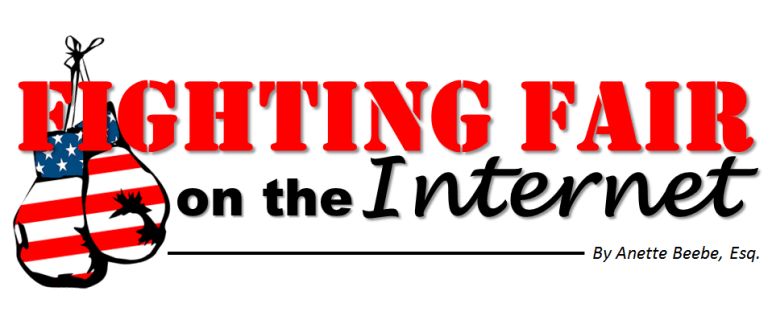
 iety needs?” with “That would be harsher punishment for parole violators Stan…and world peace!” I’m pretty sure since that movie first came out in 2000 I have been remixing that one-liner to fit my varying smarty pants comeback needs. In fact, in muddling to myself just this morning after reviewing some dyspeptic online commentary I determined that I would answer the question “That would be harsher punishment for internet defamers Stan…and world peace!” It’s true…internet defamers and harassers really do suck.
iety needs?” with “That would be harsher punishment for parole violators Stan…and world peace!” I’m pretty sure since that movie first came out in 2000 I have been remixing that one-liner to fit my varying smarty pants comeback needs. In fact, in muddling to myself just this morning after reviewing some dyspeptic online commentary I determined that I would answer the question “That would be harsher punishment for internet defamers Stan…and world peace!” It’s true…internet defamers and harassers really do suck.



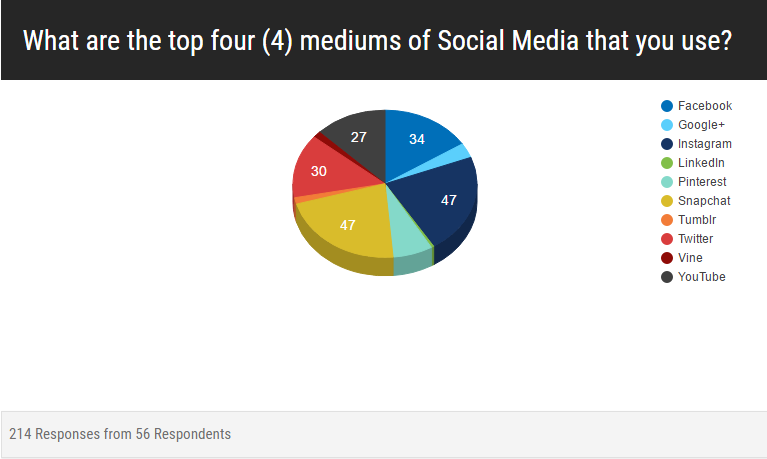
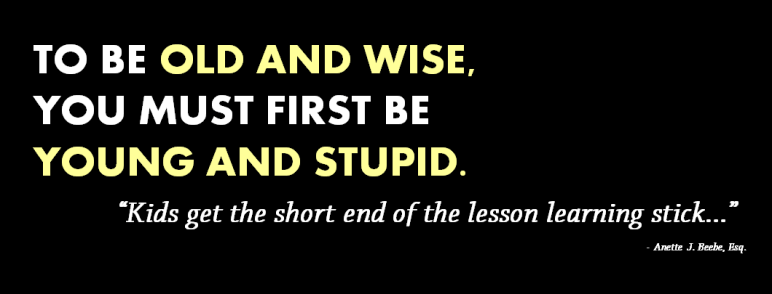
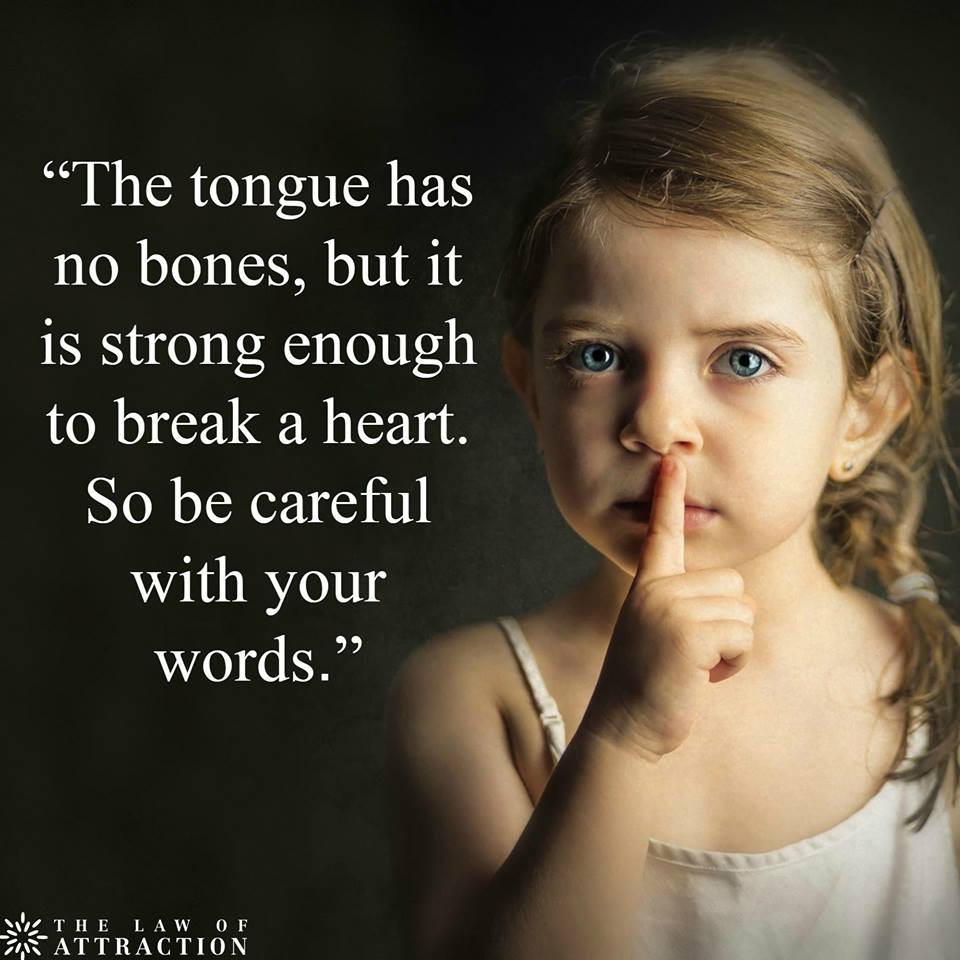 Today, while taking a mental/emotional break from the negative stress and duties that my line of work brings to me, I stumbled across this picture on a social media post. The quote “The tongue has no bones, but it is strong enough to break a heart. So be careful with your words.” Given all that I have experienced in life, and all that I see through my career path right now, I can tell you that this is such a powerful and true statement. Words do hurt…and while the focus used to be on what is being said verbally, now with a majority of our communications being
Today, while taking a mental/emotional break from the negative stress and duties that my line of work brings to me, I stumbled across this picture on a social media post. The quote “The tongue has no bones, but it is strong enough to break a heart. So be careful with your words.” Given all that I have experienced in life, and all that I see through my career path right now, I can tell you that this is such a powerful and true statement. Words do hurt…and while the focus used to be on what is being said verbally, now with a majority of our communications being 